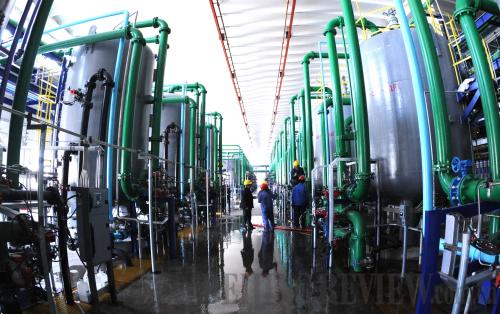|
 |
|
GREEN GROWTH: Employees at a Tianjin project of PetroChina inspect equipment used to desalinate seawater. Tianjin invests heavily in environmentally friendly and emission-reduction projects to stimulate its economy (LIU HAIFENG) |
The global economy overall is still mired in dismay—unemployment plagues America, while government debt threatens parts of Europe. But so far this year, the Chinese economy appears to be going nowhere but up—its GDP grew 11.9 percent in the first quarter, recalling the country's glory years of double-digit growth.
"This year, the economy is obviously picking up momentum, and we are off to a good start now," said Li Xiaochao, spokesman of the National Bureau of Statistics (NBS), at a press conference releasing first-quarter economic figures on April 15.
Even before the release, with buoyancy in sight, the Asian Development Bank (ADB) on April 12 lifted its forecast of China's economic growth to 9.6 percent in 2010, up from the 8.9-percent prediction made in September 2009.
While last year's downturn was attributable to a collapse in external demand, the seeds of the recovery have been predominantly homegrown. Investment in fixed assets surged 25.6 percent in the first quarter year on year. Entrusting future growth in the green economy, the government also called for a shift to focus more on energy-efficient and environmentally friendly investments.
Growth is becoming more balanced, relying more on consumption, said Zuo Xiaolei, chief economist with the Beijing-based China Galaxy Securities Co. Ltd. Retail sales leapt 17.9 percent year on year in the first quarter. Government efforts to improve the social safety net are believed to further shore up consumption by putting numerous residents on a firmer social footing and removing much of the anxiety making them prone to save.
In addition, Western consumers are opening up their wallets again after months of austerity, providing hope for Chinese exports, Zuo said.
"But it is still too early to sit back and relax our efforts," said Zuo. "The first quarter, compared to the awful experiences in 2009, gives the appearance of vibrant economic activity."
Meanwhile, concerns about inflation proliferate, which has raised the question: When will the moderately loose monetary policy come to an end?
"With a fog of uncertainties ahead, China now has to cope with extremely complex economic situations on the road to recovery," said Li Xiaochao of the NBS.
The government will maintain a pro-growth stance, but the policies will be more flexible and targeted, he said.
Inflation concerns
While the developed world continues to buckle under the strains of the recession, China faces a different dilemma—the possibility of inflation. Commercial banks pumped a deluge of lending into the economy last year, igniting fears of excess liquidity.
The consumer price index (CPI), a main gauge for inflation, increased 2.2 percent from a year earlier in the first quarter, well below the government's ceiling of 3 percent for this year. The producer price index (PPI), a barometer for inflation at the wholesale level, rose 5.2 percent year on year.
But economists were quick to warn the index is likely to see a sharp run-up in the months to come. "Food prices, especially pork, are the major reason for a lower-than-expected CPI growth. However, the prices are set to rebound due to growing demand and a severe drought in south China," said Ha Jiming, chief economist at the China International Capital Corp. Ltd.
Tang Min, Deputy Secretary General of the China Development Research Foundation, agreed. "As China fights its way out of the downturn, the temptation will arise to leave monetary policy loose for too long, resulting in runaway inflation," he said. "Meanwhile, increases in international commodity prices may also spill over into the Chinese consumer market."
Although the CPI stays within a reasonable range, it's not hard to find clues of inflationary pressure elsewhere.
A dangerous sign is the real estate market, where prices are spiraling out of control. House prices in 70 large and medium-sized cities soared 11.7 percent in March, the highest monthly growth rate since July 2005 when the index was first released. This turn of events echoes what happened in Japan in the 1980s when frothy property prices led to a bubble burst, leaving the Japanese economy stagnant for a decade.
It is urgent now to let air out of the property bubbles and preempt inflation as the economy seeks a smooth ride toward continued prosperity, said Yi Xianrong, a senior researcher with the Chinese Academy of Social Sciences.
In its latest move to clamp down on the property rush, the State Council on April 15 announced tough policies on second home purchases, with the down payment rate rising from 40 percent to 50 percent and mortgage rates 1.1 times the benchmark lending rate.
On the monetary front, the policymakers have relied on mild monetary adjustments to stabilize the economy. So far this year, the central bank twice raised the ratio of deposits commercial banks must put aside in reserves and has also aggressively drained cash from the banking system.
New renminbi loans in March totaled 510.7 billion yuan ($74.8 billion), a slump compared to the January and February when banks rushed out credit in anticipation of serious monetary tightening policies. The new loans totaled 1.39 trillion yuan ($203.6 billion) and 700.1 billion yuan ($102.5 billion) in January and February, respectively.
"In short, economic growth is strong. With stimulus already partly removed, the key is whether the authorities can steer the economy onto a more sustainable growth path, or whether generalized inflation and an asset bubble will break out in the latter half of 2010 and trigger a bigger policy-induced slowdown for China in 2011," said Stephen Green, an economist at Standard Chartered Bank in Shanghai.
| 